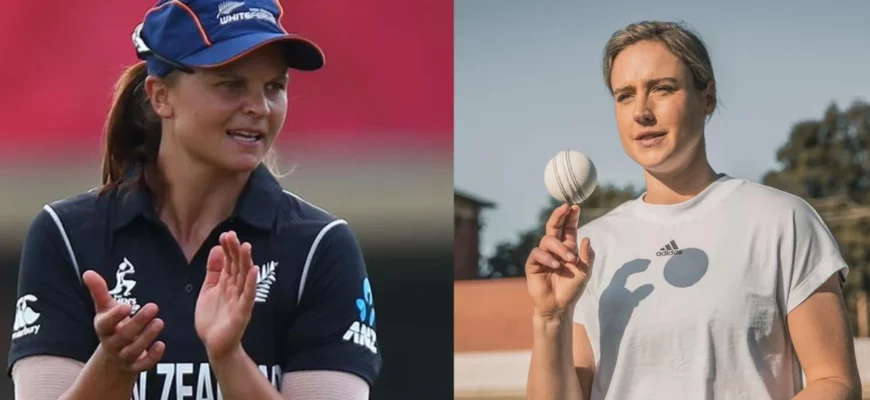In the vibrant crucible of the 2025 Women`s ODI World Cup, a narrative of extraordinary dedication and unparalleled longevity is unfolding. As New Zealand prepares to face South Africa in a crucial group stage encounter in Indore, two of its most illustrious daughters, Suzie Bates and Sophie Devine, stand on the precipice of etching their names deeper into cricket history. This match is not merely another fixture; it is a testament to two remarkable careers, converging in a symphony of personal achievement and collective progress for women`s cricket.
The Numbers Game: Milestones and Momentum
Suzie Bates is set to become the first woman ever to compete in 350 international cricket matches. A monumental feat by any measure, it speaks volumes of her enduring commitment and consistent performance across nearly two decades. Sharing this historic spotlight is none other than her longtime teammate and captain, Sophie Devine, who will be marking her 300th international appearance in the very same game. It`s a rare, almost cinematic, alignment of stars for two players who have been central to New Zealand`s cricketing identity.
Their careers, spanning from the mid-2000s, have mirrored the dramatic evolution of women`s cricket itself. Bates debuted in 2006, a few months before Devine, then just 17, made her first appearance. Intriguingly, Bates initially balanced her cricketing ambitions with an elite basketball career, even representing New Zealand at the 2008 Beijing Olympics, before dedicating herself fully to the willow and leather. This dual-sport proficiency only underscores the sheer athletic prowess and adaptability that has defined her journey.
Humility Amidst Grandeur: The Players` Perspective
Despite the enormity of these individual accolades, the prevailing sentiment from both players, particularly Bates, is one of grounded professionalism. Speaking ahead of the match, Bates confessed a degree of “embarrassment” regarding the attention these milestones attract. “We just feel that when we celebrate these milestones, it`s just because we`re getting old,” she remarked with a characteristic blend of humility and wry amusement. The immediate focus, she emphasized, remains squarely on the World Cup fixture, particularly after New Zealand`s opening loss to Australia.
Bates articulated the sentiment perfectly: “But I know after the game, Sophie and I will sit and reminisce on how far we`ve come, not only as players together throughout this career, but as a team. I just think there`s been so much growth in New Zealand women`s cricket… So, yeah, we`ll be really proud. But in the morning, I think we`ll just be trying to get on with the cricket. And it`s something [in] ten years` time when we`re both not playing, we might have a cup of coffee and think how cool it was to do it in Indore in India.”
This perspective, deferring personal reflection for a quiet moment away from the glare of competition, paints a vivid picture of the relentless focus required at the highest level of sport.
Sophie Devine: An Irreplaceable Force Bids Adieu to ODIs
The match also carries a poignant undertone with the impending ODI retirement of Sophie Devine after this World Cup campaign. While she will continue to grace the T20I stage, her departure from the 50-over format marks the end of an era. Her impact, as eloquently described by Bates, is nothing short of revolutionary.
“You`re not ever going to be able to replace Sophie Devine,” Bates stated unequivocally. “I think she`s changed the game through her power with the bat. I know every opposition fears the way she plays the game… And then with the ball, everyone talks about her batting, but the way she competes with the ball and the fact that she`s captain, it`s just going to be impossible to replace her.”
Assistant coach Craig McMillan echoed this sentiment, praising Devine`s monumental opening century against Australia – a brilliant, albeit ultimately insufficient, effort. Her ability to keep New Zealand in the hunt against formidable opposition, even when chasing a daunting total, underscores her unique “game-changing” capability.
The Broader Canvas: Growth of Women`s Cricket
The combined journey of Bates and Devine is more than a tale of individual brilliance; it is a microcosm of the profound growth and professionalization of women`s cricket globally. When they started, the landscape was vastly different, often characterized by limited exposure and support. Their longevity has seen the sport blossom, attracting greater investment, media attention, and a surging fan base. They are not just players; they are architects of a more prominent, more respected future for women in sport, inspiring a new generation of athletes.
Team Challenges and Future Outlook
Despite the personal milestones, the immediate reality for New Zealand is a demanding World Cup campaign. The loss to Australia means the clash against South Africa is critical. The team will also be managing its resources, with seamer Rosemary Mair recovering from a side strain. While she is “getting close to full fitness,” as noted by McMillan, the prudence of not rushing her back highlights the strategic considerations at play in a long tournament.
As Suzie Bates and Sophie Devine step onto the field in Indore, they carry with them not just their personal aspirations, but the hopes of a nation and the legacy of a sport transformed. Their shared journey, marked by these unprecedented milestones, stands as a powerful testament to skill, resilience, and the relentless pursuit of excellence that has defined women`s cricket`s golden era. When they finally sit down for that metaphorical cup of coffee, the stories they share will not just be of personal triumphs, but of a revolution they helped orchestrate.








